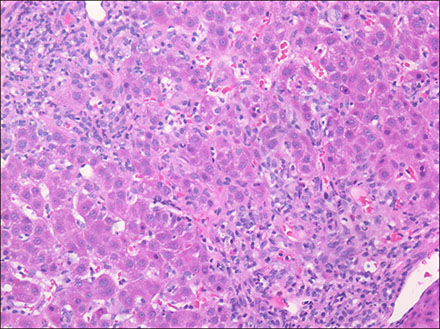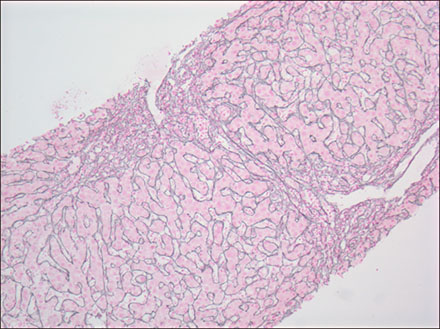Pediatr Gastroenterol Hepatol Nutr.
2018 Oct;21(4):347-350. 10.5223/pghn.2018.21.4.347.
Minocycline-Induced Autoimmune Hepatitis: A Rare But Important Cause of Drug-Induced Autoimmune Hepatitis
- Affiliations
-
- 1Department of Medicine-Pediatrics, Rush University Medical Center, Chicago, IL, United States.
- 2Section of Pediatric Gastroenterology, Rush University Medical Center, Chicago, IL, United States. anil_a_kesavan@rush.edu
- KMID: 2421999
- DOI: http://doi.org/10.5223/pghn.2018.21.4.347
Abstract
- Drug-induced autoimmune hepatitis (DIAIH) is an increasingly recognized form of drug-induced liver injury that leads to a condition similar to idiopathic autoimmune hepatitis. A number of drugs have been associated with DIAIH, minocycline is one of the most well characterized. Minocycline is a semisynthetic tetracycline antibiotic used in the treatment of acne vulgaris. Minocycline-induced autoimmune hepatitis presents with serologic and histologic features similar to idiopathic autoimmune hepatitis. However, the natural history and outcomes of these two conditions differ significantly. The majority of patients with minocycline-induced autoimmune hepatitis experience complete resolution of symptoms after withdrawal of the medication. Some patients may require a short course of steroids and rarely use of an immunomodulator to achieve resolution of disease. Recurrence of symptoms is rare and typically only occurs with reintroduction of minocycline. It is important for primary care providers to consider minocycline-induced autoimmune hepatitis when liver injury develops during minocycline therapy.
MeSH Terms
Figure
Reference
-
1. Teitelbaum JE, Perez-Atayde AR, Cohen M, Bousvaros A, Jonas MM. Minocycline-related autoimmune hepatitis. Arch Pediatr Adolesc Med. 1998; 152:1132–1139.
Article2. Lawrenson RA, Seaman HE, Sundstrom A, Williams TJ, Farmer RDT. Liver damage associated with minocycline in use in acne. Drug Saf. 2000; 23:333–349.3. Elkayam O, Yaron M, Caspi D. Minocycline-induced autoimmune syndromes: an overview. Semin Arthritis Rheum. 1999; 28:392–397.
Article4. Goldstein NS, Bayati N, Silverman AL, Gordon SC. Minocycline as a cause of drug-induced autoimmune hepatitis. Report of four cases and comparison with autoimmune hepatitis. Am J Clin Pathol. 2000; 114:591–598.5. Ramakrishna J, Johnson AR, Banner BF. Long-term minocycline use for acne in healthy adolescents can cause severe autoimmune hepatitis. J Clin Gastroenterol. 2009; 43:787–790.
Article6. Bjornsson E, Talwalkar J, Treeprasertsuk S, Kamath PS, Takahashi N, Sanderson S, et al. Drug-induced autoimmune hepatitis: clinical characteristics and prognosis. Hepatology. 2010; 51:2040–2048.
Article7. Urban T, Nicoletti P, Chalasani N, Serrano J, Stolz A, Daly AK, et al. Minocycline hepatotoxicity: clinical characterization and identification of HLA-B/35:02 as a risk factor. J Hepatol. 2017; 67:137–144.
Article8. De Boer YS, Kosinski AS, Urban TJ, Zhao Z, Long N, Chalasani N, et al. Features of autoimmune hepatitis in patients with drug-induced liver injury. Clin Gastroenterol Hepatol. 2017; 15:103–112.
Article9. Czaja AJ. Drug-induced autoimmune-like hepatitis. Dig Dis Sci. 2011; 56:958–976.
Article10. Ford TJ, Dillon JF. Minocycline hepatitis. Eur J Gastroenterol Hepatol. 2008; 20:796–799.
Article11. Chamberlain MC, Schwarzenberg SJ, Akin EU, Kurth MH. Minocycline-induced autoimmune hepatitis with subsequent cirrhosis. J Pediatr Gastroenterol Nutr. 2006; 42:232–235.
Article
- Full Text Links
- Actions
-
Cited
- CITED
-
- Close
- Share
- Similar articles
-
- Autoimmune hepatitis and thyroiditis associated with antituberculous medications: A case report
- Drug-induced hepatitis complicated by pure red cell aplasia and autoimmune hemolytic anemia: a case report
- A Case of Lupus-Related Hepatitis Mimicking Autoimmune Hepatitis
- A Case of Drug-Induced Autoimmune Hepatitis after Glucosamine Ingestion
- Cyclosporine Treatment in a Patient with Concurrent Autoimmune Urticaria and Autoimmune Hepatitis




